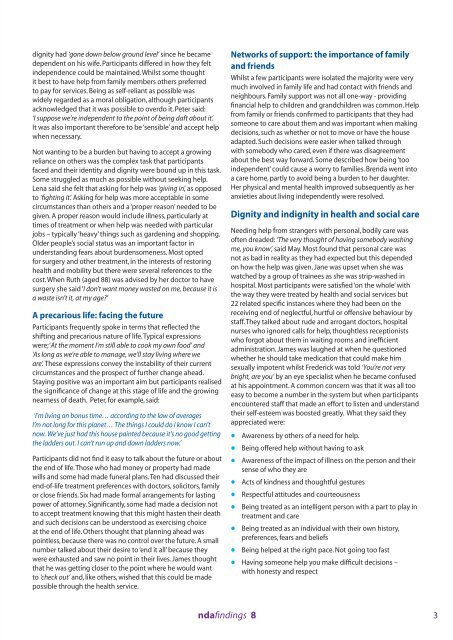Maintaining Dignity in Later Life - New Dynamics of Ageing ...
Maintaining Dignity in Later Life - New Dynamics of Ageing ...
Maintaining Dignity in Later Life - New Dynamics of Ageing ...
You also want an ePaper? Increase the reach of your titles
YUMPU automatically turns print PDFs into web optimized ePapers that Google loves.
dignity had ‘gone down below ground level’ s<strong>in</strong>ce he becamedependent on his wife. Participants differed <strong>in</strong> how they felt<strong>in</strong>dependence could be ma<strong>in</strong>ta<strong>in</strong>ed. Whilst some thoughtit best to have help from family members others preferredto pay for services. Be<strong>in</strong>g as self-reliant as possible waswidely regarded as a moral obligation, although participantsacknowledged that it was possible to overdo it. Peter said:‘I suppose we’re <strong>in</strong>dependent to the po<strong>in</strong>t <strong>of</strong> be<strong>in</strong>g daft about it’.It was also important therefore to be ‘sensible’ and accept helpwhen necessary.Not want<strong>in</strong>g to be a burden but hav<strong>in</strong>g to accept a grow<strong>in</strong>greliance on others was the complex task that participantsfaced and their identity and dignity were bound up <strong>in</strong> this task.Some struggled as much as possible without seek<strong>in</strong>g help.Lena said she felt that ask<strong>in</strong>g for help was ‘giv<strong>in</strong>g <strong>in</strong>’, as opposedto ‘fight<strong>in</strong>g it’. Ask<strong>in</strong>g for help was more acceptable <strong>in</strong> somecircumstances than others and a ‘proper reason’ needed to begiven. A proper reason would <strong>in</strong>clude illness, particularly attimes <strong>of</strong> treatment or when help was needed with particularjobs – typically ‘heavy’ th<strong>in</strong>gs such as garden<strong>in</strong>g and shopp<strong>in</strong>g.Older people’s social status was an important factor <strong>in</strong>understand<strong>in</strong>g fears about burdensomeness. Most optedfor surgery and other treatment, <strong>in</strong> the <strong>in</strong>terests <strong>of</strong> restor<strong>in</strong>ghealth and mobility but there were several references to thecost. When Ruth (aged 88) was advised by her doctor to havesurgery she said ‘I don’t want money wasted on me, because it isa waste isn’t it, at my age?’A precarious life: fac<strong>in</strong>g the futureParticipants frequently spoke <strong>in</strong> terms that reflected theshift<strong>in</strong>g and precarious nature <strong>of</strong> life. Typical expressionswere; ‘At the moment I’m still able to cook my own food’ and‘As long as we’re able to manage, we’ll stay liv<strong>in</strong>g where weare’. These expressions convey the <strong>in</strong>stability <strong>of</strong> their currentcircumstances and the prospect <strong>of</strong> further change ahead.Stay<strong>in</strong>g positive was an important aim but participants realisedthe significance <strong>of</strong> change at this stage <strong>of</strong> life and the grow<strong>in</strong>gnearness <strong>of</strong> death. Peter, for example, said:‘I’m liv<strong>in</strong>g on bonus time… accord<strong>in</strong>g to the law <strong>of</strong> averagesI’m not long for this planet… The th<strong>in</strong>gs I could do I know I can’tnow. We’ve just had this house pa<strong>in</strong>ted because it’s no good gett<strong>in</strong>gthe ladders out. I can’t run up and down ladders now.’Participants did not f<strong>in</strong>d it easy to talk about the future or aboutthe end <strong>of</strong> life. Those who had money or property had madewills and some had made funeral plans. Ten had discussed theirend-<strong>of</strong>-life treatment preferences with doctors, solicitors, familyor close friends. Six had made formal arrangements for last<strong>in</strong>gpower <strong>of</strong> attorney. Significantly, some had made a decision notto accept treatment know<strong>in</strong>g that this might hasten their deathand such decisions can be understood as exercis<strong>in</strong>g choiceat the end <strong>of</strong> life. Others thought that plann<strong>in</strong>g ahead waspo<strong>in</strong>tless, because there was no control over the future. A smallnumber talked about their desire to ‘end it all’ because theywere exhausted and saw no po<strong>in</strong>t <strong>in</strong> their lives. James thoughtthat he was gett<strong>in</strong>g closer to the po<strong>in</strong>t where he would wantto ‘check out’ and, like others, wished that this could be madepossible through the health service.Networks <strong>of</strong> support: the importance <strong>of</strong> familyand friendsWhilst a few participants were isolated the majority were verymuch <strong>in</strong>volved <strong>in</strong> family life and had contact with friends andneighbours. Family support was not all one-way - provid<strong>in</strong>gf<strong>in</strong>ancial help to children and grandchildren was common. Helpfrom family or friends confirmed to participants that they hadsomeone to care about them and was important when mak<strong>in</strong>gdecisions, such as whether or not to move or have the houseadapted. Such decisions were easier when talked throughwith somebody who cared, even if there was disagreementabout the best way forward. Some described how be<strong>in</strong>g ‘too<strong>in</strong>dependent’ could cause a worry to families. Brenda went <strong>in</strong>toa care home, partly to avoid be<strong>in</strong>g a burden to her daughter.Her physical and mental health improved subsequently as heranxieties about liv<strong>in</strong>g <strong>in</strong>dependently were resolved.<strong>Dignity</strong> and <strong>in</strong>dignity <strong>in</strong> health and social careNeed<strong>in</strong>g help from strangers with personal, bodily care was<strong>of</strong>ten dreaded: ‘The very thought <strong>of</strong> hav<strong>in</strong>g somebody wash<strong>in</strong>gme, you know’, said May. Most found that personal care wasnot as bad <strong>in</strong> reality as they had expected but this dependedon how the help was given. Jane was upset when she waswatched by a group <strong>of</strong> tra<strong>in</strong>ees as she was strip-washed <strong>in</strong>hospital. Most participants were satisfied ‘on the whole’ withthe way they were treated by health and social services but22 related specific <strong>in</strong>stances where they had been on thereceiv<strong>in</strong>g end <strong>of</strong> neglectful, hurtful or <strong>of</strong>fensive behaviour bystaff. They talked about rude and arrogant doctors, hospitalnurses who ignored calls for help, thoughtless receptionistswho forgot about them <strong>in</strong> wait<strong>in</strong>g rooms and <strong>in</strong>efficientadm<strong>in</strong>istration. James was laughed at when he questionedwhether he should take medication that could make himsexually impotent whilst Frederick was told ‘You’re not verybright, are you’ by an eye specialist when he became confusedat his appo<strong>in</strong>tment. A common concern was that it was all tooeasy to become a number <strong>in</strong> the system but when participantsencountered staff that made an effort to listen and understandtheir self-esteem was boosted greatly. What they said theyappreciated were:• Awareness by others <strong>of</strong> a need for help.• Be<strong>in</strong>g <strong>of</strong>fered help without hav<strong>in</strong>g to ask• Awareness <strong>of</strong> the impact <strong>of</strong> illness on the person and theirsense <strong>of</strong> who they are• Acts <strong>of</strong> k<strong>in</strong>dness and thoughtful gestures• Respectful attitudes and courteousness• Be<strong>in</strong>g treated as an <strong>in</strong>telligent person with a part to play <strong>in</strong>treatment and care• Be<strong>in</strong>g treated as an <strong>in</strong>dividual with their own history,preferences, fears and beliefs• Be<strong>in</strong>g helped at the right pace. Not go<strong>in</strong>g too fast• Hav<strong>in</strong>g someone help you make difficult decisions –with honesty and respectndaf<strong>in</strong>d<strong>in</strong>gs 83
















